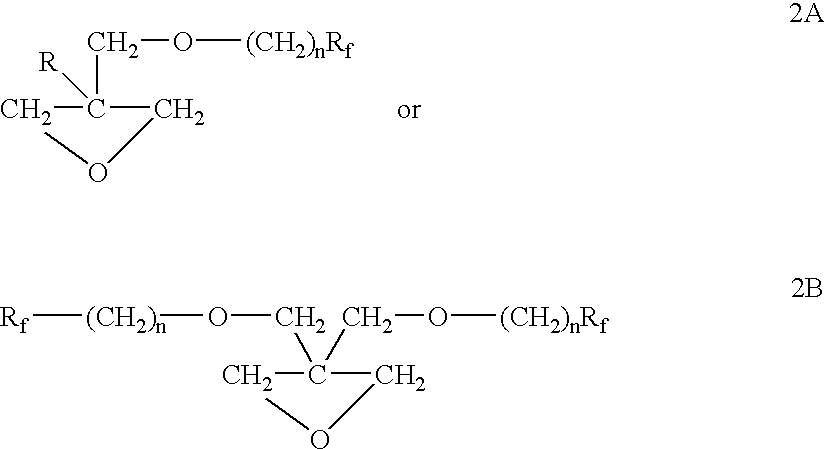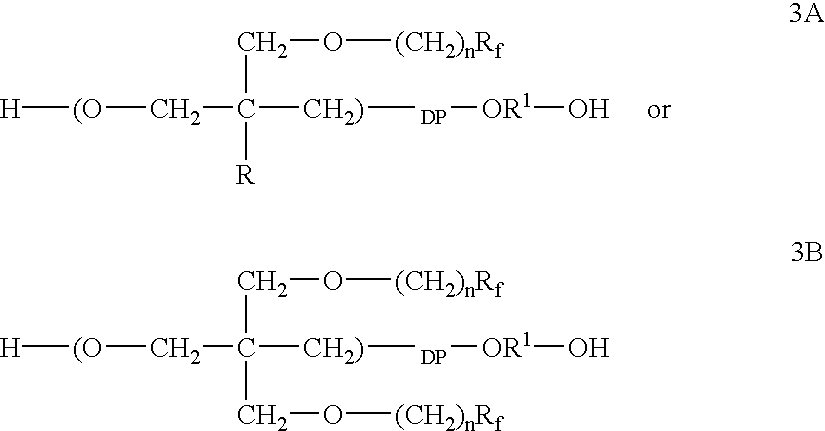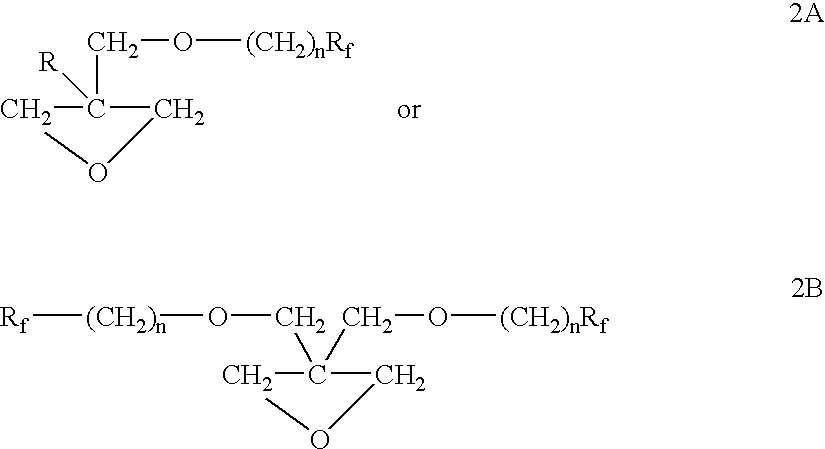Fluorinated short carbon atom side chain and polar group containing polymer, and flow, or leveling, or wetting agents thereof
a technology of fluorinated short carbon atoms and polar groups, which is applied in the direction of polishing compositions, chemistry apparatus and processes, and polishing compositions with abrasives, etc., can solve the problems of limiting their utility, and achieve the effects of improving wetting, or flow, and effective wetting, or flow, and less propensity to cause foaming
- Summary
- Abstract
- Description
- Claims
- Application Information
AI Technical Summary
Benefits of technology
Problems solved by technology
Method used
Image
Examples
example m2
Preparation of 7-FOX Using PTC Process 3-(2,2,3,3,4,4,4-Heptafluorobutoxymethyl)-3-Methyloxetane
A 2 L, 3 necked round bottom flask fitted with a reflux condenser, a mechanical stirrer, a digital thermometer and an addition funnel was charged with 3-bromomethyl-3-methyloxetane (351.5 g, 2.13 mol), heptafluorobutan-1-ol (426.7 g, 2.13 mol), tetrabutylammonium bromide (34.4 g) and water (85 mL). The mixture was stirred and heated to 75.degree. C. Next, a solution of potassium hydroxide (158 g, 87% pure, 2.45 mol) in water (200 mL) was added and the mixture was stirred vigorously at 80.degree.-85.degree. C. for 4 hours. The progress of the reaction was monitored by GLC and when GLC analysis revealed that the starting materials were consumed, the heat was removed and the mixture was cooled to room temperature. The reaction mixture was diluted with water and the organic layer was separated and washed with water, dried and filtered to give 566 g (94%) of crude product. The crude product wa...
example m3
Sodium hydride (50% dispersion in mineral oil, 18.4g, 0.383 mol) was washed with hexanes (2.times.) and was suspended in DMF (200 mL). Then trifluoroethanol (38.3 g, 0.383 mol) was added dropwise over 45 min while hydrogen gas was evolved. The mixture was stirred for 30 min and a solution of 3,3-bis-(hydroxymethyl)oxetane di-p-toluenesulfonate (30.0 g, 0.073 mol) in DMF (50 mL) was added. The mixture was heated to 75.degree. C. for 64 h when .sup.1 H NMR analysis of an aliquot showed that the starting sulfonate had been consumed. The mixture was poured into water and extracted with methylene chloride (2.times.). The combined organic extracts were washed with brine, 2% aqueous HCl, water, dried (MgSO.sub.4), and evaporated to give 17.5 g (100%) of 3,3-bis-(2,2,2-trifluoroethoxymethyl)oxetane as an oil containing DMF (<1%). The oil was purified by bulb-to-bulb distillation at 42-48.degree. C. (10.1 mm) to give 15.6 g (79%) of analytically pure B3-FOX, colorless oil: IR (KBr) 2960-2880...
example p1
Homopolymerization of 3-FOX 3-(2,2,2-Trifluoroethoxymethyl)-3-methyloxetane
A solution of 34.3 milligrams (0.38 mmol) of butane-1,4-diol and 109.7 milligrams (0.77 mmol) of boron trifluoride etherate in 4 grams of methylene chloride was stirred at ambient temperature for 15 minutes under nitrogen in a dry polymerization flask. The solution was cooled to 1.5.degree. C. and a solution of 1.20 grams (6.52 mmol) of 3-(2,2,2-trifluoroethoxymethyl)-3-methyloxetane in 1.3 grams of methylene chloride was added, The resultant solution was stirred for 5 hours at 1.degree.-2.degree. C. at which time .sup.1 H NMR analysis of an aliquot indicated that the starting oxetane had been consumed. The solution was warmed to ambient temperature and quenched with water. The organic layer was washed with brine, 2 weight percent aqueous hydrochloric acid, and evaporated to give 1.053 grams of poly-3-(2,2,2-trifluoroethoxymethyl)-3-methyloxetane as an oil, corresponding to a 88 percent yield. The polymer ana...
PUM
| Property | Measurement | Unit |
|---|---|---|
| average degree of polymerization | aaaaa | aaaaa |
| average degree of polymerization | aaaaa | aaaaa |
| average degree of polymerization | aaaaa | aaaaa |
Abstract
Description
Claims
Application Information
 Login to View More
Login to View More - R&D
- Intellectual Property
- Life Sciences
- Materials
- Tech Scout
- Unparalleled Data Quality
- Higher Quality Content
- 60% Fewer Hallucinations
Browse by: Latest US Patents, China's latest patents, Technical Efficacy Thesaurus, Application Domain, Technology Topic, Popular Technical Reports.
© 2025 PatSnap. All rights reserved.Legal|Privacy policy|Modern Slavery Act Transparency Statement|Sitemap|About US| Contact US: help@patsnap.com



